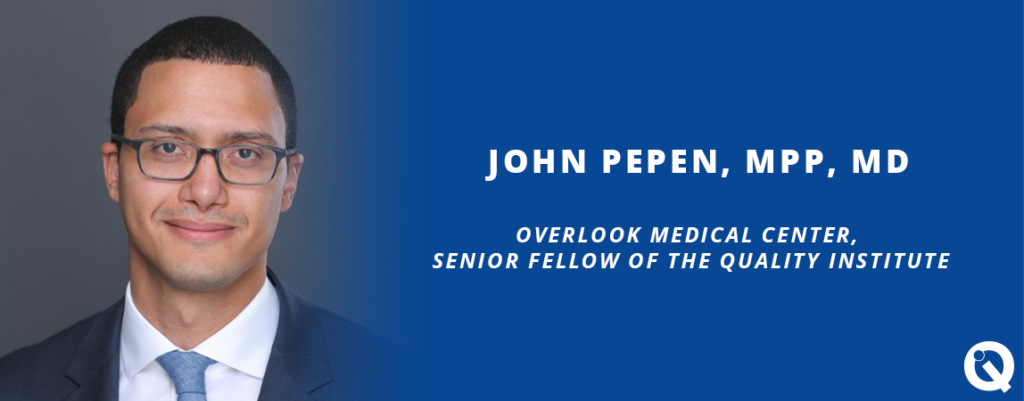John Pepen, MPP, MD, is a surgeon at Atlantic Health System’s Overlook Medical Center and a Senior Fellow of the Quality Institute. Dr. Pepen brings his clinical expertise and direct patient experience to support the Mayors Wellness Campaign and the development of programs that address social drivers of health.
As a general surgeon focused on emergency surgery, what drew you to focus on social drivers of health?
When you look at these social drivers or social determinants of health, what you find is that they tend to influence health and health outcomes more than the things I do every day. The conditions in which people are born, grow, live, work and age make more of an impact on their health than any surgery I do or any medication that I can prescribe. So, professionally, focusing on these social drivers of health was just a way to complement the work I do every day.
We’re excited about your work with the Mayors Wellness Campaign (MWC). What are the tools you are most excited about getting into the mayors’ hands?
Our focus is on improving the MWC toolkit that mayors use to develop community programs by making it more problem-focused and evidence-based. When Julie DeSimone, the Quality Institute’s MWC Program Officer, and I looked critically at the toolkit, we noticed it does a pretty good job of what it was intended to do, namely, provide ways to improve health in the community. But one thing we wanted was a specific naming of the problem the interventions were meant to solve. Maybe this is from my medical background, but the way I think about things is I like to clearly state the problem and then think about solutions.
What exactly, for example, is a food bank meant to solve? Well, it’s meant to solve food insecurity. By naming the problem, you’re able to look at the literature and see if there are alternative evidence-based solutions. Aside from this problem-focused approach, we’re also going to be exploring and offering evidence-based solutions. Since the original toolkit was developed, there has been an explosion of literature examining social determinants and the specific interventions that have the highest impact. By highlighting the findings from this literature, we are hoping that the toolkit gives communities ideas about high-impact, cost-effective interventions they can make to improve the health of their communities.
We’re also trying to leverage the institutional knowledge of MWC to highlight many of the previous programs developed by towns in the hopes that they serve as an example to other communities.
How can public health, local officials, and the health care system work together to improve the lives of their communities?
There must be extensive cross-sector collaboration between the medical and non-medical sectors. Within the medical sector, there has been an improvement in the recognition of the importance of social determinants. For example, some electronic medical records have areas that highlight these social drivers and we have social workers and case managers in our hospitals who are adept at finding resources for patients who need them. But you’re still constrained in how much you can do in a hospital setting and there is this still this gap between medical and non-medical silos that programs like NowPow attempt to fill. We need more of these programs.
We also need to shift our focus and policy goals to emphasize that the health of our communities is our ultimate goal, with the realization that providing housing, affordable and nutritious food, and a suitable income are, for example, ways to achieve that goal. Finally, we need appropriate public funding to address these social determinants. No amount of cross sector collaboration is going to provide rental assistance, increase the minimum wage, strengthen the social safety net, and provide a good public education.
You have said that you empathize with low-income families that must choose, say, between buying food or buying medicine. Can you share how your upbringing has influenced your perspective?
My parents were Dominican immigrants, and I grew up in a low-income household. We relied on government assistance for the first several years of my life to help pay for groceries, rent, and health care. Thankfully, due to the presence of my extended family providing childcare, my parents were able to work several jobs that provided my sister and I the opportunity to be successful. And as I look back at the way I was brought up, we had to make these difficult tradeoffs. So when I hear patients say, ‘Should I pay for my prescriptions, or save money for the groceries?’ it resonates with me. It influences my work now, mostly in the sense that I want to ensure that people aren’t faced with the same tradeoffs my parents had to deal with.
We like to also ask a question that goes beyond just a person’s professional life. Where could we find you on a weekend away from work?
Well, I know this sounds boring, but you will see me with my wife and our six-month-old daughter and our dog. I am also an avid mountain climber and am right now training to climb Aconcagua, a mountain in Argentina.

